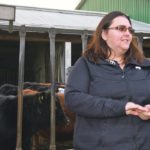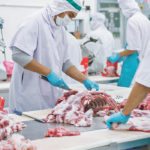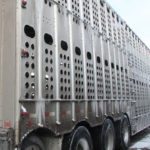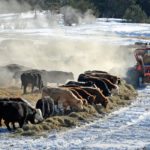The source of bovine tuberculosis in a southern Alberta cow herd may be an enduring mystery. The disease did not affect trade, but for those involved with the loss of 11,500 cattle, the impact was devastating, said a Canadian Food Inspection Agency official. “How did it get here? All of us would like to know […] Read more
Stories by Barbara Duckworth
Calculate feed requirements, quality to save money
OLDS, Alta.— Weather extremes across Western Canada can sometimes cause livestock feed shortages. Farmers must calculate availability and cost before a single load of feed is purchased, said Barry Yaremcio, beef specialist with Alberta Agriculture. “Figure out what you can feed and when you can feed it to minimize your costs,” he said at a […] Read more
Private funds eyed for wheat, barley research
BANFF, Alta. — There could be an appetite for private investment into wheat and barley research. The federal government has designated funds for research under the Canadian Agriculture Partnership, but industry is also expected to contribute money. There is room for private contributions, said Holly Mayer of Agriculture Canada’s science and technology division. “One of […] Read more
Producers can build a better dairy cow through genomics
OTTAWA — Dairy cow improvement with natural selection could be eclipsed by big data and genomic technology. By unravelling the DNA of individuals, future generations of cows could be more vigorous, live longer and turn a profit sooner. “More efficient animals produce more milk and less manure,” said producer David Wiens at a November dairy […] Read more

Ont. beef research gets funding boost
ELORA, Ont. — The University of Guelph’s beef research program is receiving a $15.2 million investment designed to create state-of-the-art facilities and expand re-search on key questions like feed efficiency and sustain-ability. Located at Elora. Ont., the 300-head cowherd is also likely to go through some changes as well, said Katie Wood, an assistant professor […] Read more
Alberta beef plans vote on checkoff changes
Resolutions supporting a vote on reformulating Alberta’s beef service charges have received producer approval. Delegates to the Alberta Beef Producers annual meeting want a clearly worded question for a producer plebiscite on the status of the $3 per head checkoff as well as information about how money is spent and how it might be divided […] Read more

Eat local campaigns keep slaughter cattle home
The current condition for Canadian beef is profitability, while the 2018 forecast is steady with a chance of volatility. Canfax research manager Brenna Grant said “2017 was a year of surprising strength that wasn’t anticipated to be there.” Large supplies of beef, pork and poultry in Canada and the United States were expected to pressure […] Read more

Problem areas found in cattle transport study
Transportation of cattle can be a contentious public issue. Alberta Farm Animal Care has released preliminary results of a compromised cattle benchmarking project in which the condition of animals arriving at auction markets, provincial abattoirs and a federal meat plant were evaluated for a year. Led by Agriculture Canada researcher Karen Schwartzkopf-Genswein at the Lethbridge […] Read more
Sustainable beef criteria not difficult to meet: rancher
The concept of certified sustainable beef production has been bandied about for several years, and with the release of a framework for producers and processors to follow, customers should soon see that seal of approval. The Canadian Roundtable on Sustainable Beef released its guidelines Dec. 7 for producing a certified product. “We recognize there are […] Read more

Few financial gains for carbon reduction in agriculture
Canadian farmers are already efficient producers and have a small carbon footprint: Canadian Federation of Agriculture
GUELPH, Ont. — Agriculture’s ability to remove carbon dioxide from the atmosphere and store it in the soil is gaining traction among climate change policy makers. “No other sector has this ability, and it is being recognized globally,” said environmental consultant Karen Haugen-Kozyra, head of Iresco Solutions in Alberta. The next step is to find […] Read more



